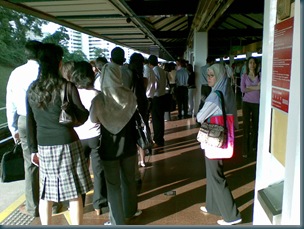Well. In almost all urbanized culture (or at least ones with good public transportation systems). we hear about the culture of the taxi driver story; this referring to the stories that you hear and the conversations that take place within the confides and privacy of a taxi ride, a kin to confessionals and private interrogation. I wonder if the greatest triumph of observational studies may actually be the insurmountable information gathered by these individuals.
Note: I sideline from referring to these accounts as fact as errors that make itself present in regular observational studies also - and usually more drastically - applies to that of taxi conversations.
Recently, I had an interesting conversation with a particular cab driver.
It started out with a well mannered conversation with a large range of topics. Eventually, he began talking about the 'kinds' of passengers that he had. You see, when I got in the cab, I told him to go to "Spring Building". At this, he turns to me and asked me if its "the one in Tampines". I tell him that it is not that building (Spring Building: 29 Tampines St 92 - no). I tell him its the one at Bt Merah. He then asked me how I'd get there usually. I tell him. THEN. Oh yes - THEN! he began this conversation about how I was "good" because I "at least knew where I wanted to go, unlike those aunties!".
Me: Aunties?
Taxi Driver, TD: Yeah - the old aunties. they get in the car then they say "ah boy - go to the clementi coffee shop with yellow chairs. I tell you... I want to punch them in the face! I see them wave down - I don't pick them up!
Me: Serious?
TD: got one time. I pick up this lady got her daughter with her from NUS. the daughter so old ask her grandmother go pick up - no face, eh?... come to the house, already raining.... then i give her change but then she sit in the cab don't want to come out. You know what she want me to do?
Me: uh? don't know.
TD: she want me to go out and open the door for her! Wah liao. she think he daughter made of gold?! i not her [chauffeur], Taxi driver. siao.
Me: wow. so what did you do?
TD: I clever one. I sit in the car then I blast the radio on with some hindustani music! she damn irritated then she left the cab. Siao, ah.
...(relevant content that's about the same, hence not transcribed)...
TD: Ya! All them stupid. All those old ladies - must die. Some more; they tell me "how can you don't know? - all taxi drivers will know". I tell you - I want to beat them up, lor....
Me: eh, chill, la uncle. how can so violent one.
TD: ...how cannot? so stupid, old senile a$$h0!3s. should die wan. I tell you - god also kill them one. I don't care you Buddhist, Hindu, Islam - I don't care. sure kill this kind of people. Got people old ask me to take them to the famous chili crab place. Then - I tell him I don't know. Then he call me stupid. F**king a$$ho!3....
Well you get the idea. I remember this ad-verbatim only because i decided to write this down immediately after I got off the ride.
But, other stuff he said, included:
"I don't care even if you pray to the tree to get 4D - but if you don't believe in god you're stupid! I will punch anyone who says there is no god in the face."
"80% of taxi drivers are idiots."
"98% of all passengers are okay can tahan. but got 2% of all of them i will say "no need to pay the fare - i'll give you 10 dollars. get out and take another cab"."
Awesome stuff.
I realize that simple indiscretions are okay. But this was point worthy in the concept of stereotypes, prejudice, and discrimination.
Prejudice accounts for the negative attitude of a person against a group, while stereotyping refers to the generalization of a set of characteristics to all members of a specific group, regardless of variations. In this case, our dear taxi driver had prejudice ideas against elderly females and atheist and also stereotyped them.
Lastly, there was a large element above all of this. He stated that he would not pick up elderly females because of the stereotype. That act encompasses the behavioural aspect of prejudice, discrimination.
In prejudice, the formation of group is primary, grouping people into categories based on similar characteristics while downplaying individual differences and overplaying similiarities. Once this scheme is formed, people are easily pigeoned holed.
Patricia Devine and her colleagues (1989) fairly recently attributed stereotypes to automatic processing instead of controlled processing. Their Two-Step Cognitive Processing model predicts that when certain statement or topic which fits a stereotyped category is perceived (picking up people - bad customers - not knowing where to go) an automatic response brings about the stereotype characteristic to memory. In the other step, controlled processing is used instead. In this, the processing is conscious and one can assess the information and react accordingly, either ignoring or disregarding the stereotype. With controlled processing, one can evaluate the statement or topic for memory accessible information that correlates with the statement by looking at prototypes one may know (like old ladies that you know that *are* nice and *know* where to go) and/or by evaluating the stereotype group in question (old ladies are supposed to be nice, aren't they?).
I guess the thing to realize is that the taxi driver was a victim as well. Notice, how people assume that taxi drivers *must* know where all the *famous* places are and *must* know who to get there?
Interesting.
